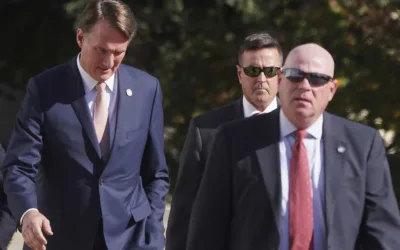This is the first in a three-part series examining the impact of climate change on the Commonwealth to commemorate Earth Day.
While the Commonwealth celebrated Easter in relative peace, significant flooding in Virginia Beach caused the delay or cancellation of many Easter events.
After last spring’s series of floods, locals have worried that this may be the new normal, and indeed, their concerns are valid. While the specter of climate change looms large around the globe, Virginia is particularly vulnerable to the effects of a warming planet.
According to a 2015 report by the Georgetown Climate Center, sea levels along Virginia’s coastline are rising faster than in the past, and population centers near the coast face increasing flood risks from rising sea levels and destructive storm surges escalated by climate change.
Scientists expect Virginia will experience 2 feet of sea-level rise by 2045, meaning coastal communities will likely face floods that dwarf all historical precedent.
The Hampton Roads area, home to 1.7 million people, is at particular risk, and is the second-most vulnerable area in the country to rising seas, behind only New Orleans.
In fact, this area has already seen an increase in minor tidal floods that can block roads and damage homes. In 2016, Norfolk experienced 11 minor flood days, compared to only 4 such days in 1995.
It’s not just Hampton Roads. More than 400,000 homes around Virginia are at risk for storm surge damage and the projected costs for repairs is a whopping $92 billion.
Beyond the damage these floods can do to homes, there’s also enormous risk to the economy, electric grid infrastructure and transportation networks. These floods may also prove deadly, or at least harmful to Virginians’ health.
According to an April 2018 report from the National Resources Defesce Council (NRDC), more than 60% of Hampton Roads residents fear that the effects of sea level rise have already put their health at risk. The one-two punch of sea level rise and coastal storms could make evacuation dangerous or impossible and might disrupt emergency health services, leading to delays in care or loss of life.
These risks would also have a disproportionate impact on lower-income communities. Areas of Norfolk and Portsmouth are among the poorest in the state, meaning flood damage could prove catastrophic to residents.
These are some of the risks facing the Commonwealth. So what’s being done to prevent or prepare for them?
Not very much, actually.
While 85% of Virginians believe climate change is happening and a clear majority want more action on climate change, the Republican-controlled General Assembly has shown little desire to tackle climate change and has largely rejected bills that attempted to deal with the issue of flooding.
In 2018, Republican members of a House Committee blocked a bill sponsored by state Sen. Lynwood Lewis (D-Accomack County) that would have created a regional authority in Hampton Roads to address sea level rise, land subsidence and coastal flooding.
The General Assembly did pass a bill in 2018 that established a Special Assistant to the Governor for Coastal Adaptation and Protection, but that did not assuage concerned Virginians. In last November’s elections, Virginia voters voted to cut taxes on homes in flood-prone areas, a move that concerns some climate experts who say it could encourage people to remain in vulnerable areas.
The measure, which was codified into law in February, did win the support of some Virginia environmental groups, including Wetlands Watch, which supported the policy on the basis that it would prevent the local tax base from collapsing while the state engineered a more tangible long-term solution.
That long-term solution remains elusive, however, and nothing less than the future of coastal Virginia hangs in the balance.

Here’s everything you need to know about this month’s Mercury retrograde
Does everything in your life feel a little more chaotic than usual? Or do you feel like misunderstandings are cropping up more frequently than they...

VIDEO: Check out Dogwood’s new merch line
Big news, Virginia! We've officially launched our Dogwood merch line 🎉 This year, we celebrate 5 years of bringing you Virginia news you can use....

VIDEO: Your support matters!
Your support matters! Donate today. @vadogwoodnews Your support matters! Visit our link in bio to donate today. #virginianews #virginia #community...

Op-Ed: Virginia’s new Democratic majorities pass key bills to improve your lives, but will Youngkin sign them?
The 2024 Virginia General Assembly regular session has wrapped up. It was a peculiar session from the outset, with Democratic majorities in the...

From the state rock to the state flower, here’s how Virginia got its symbols
Have you ever wondered why the Dogwood is the state flower? Or how the cardinal became the state bird? We’re here to answer those questions and more...

VIDEO: Second-gentleman Douglas Emhoff gives speech on reproductive freedom
Second gentleman, Douglas Emhoff touched on reproductive freedom not only being a woman's issue but "an everyone's issue" during the Biden-Harris...




